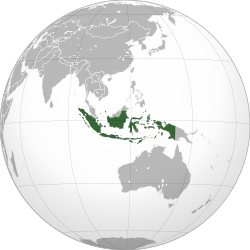From Wikipedia, the free encyclopedia
| Republic of Indonesia
Republik Indonesia
|
||||||
|---|---|---|---|---|---|---|
|
||||||
| Motto: "Bhinneka Tunggal Ika" (Old Javanese) "Unity in Diversity" National ideology: Pancasila[1][2] |
||||||
| Anthem: Indonesia Raya Great Indonesia |
||||||
| Capital and largest city |
Jakarta 6°10.5′S 106°49.7′E |
|||||
| Official languages | Indonesian | |||||
| Demonym | Indonesian | |||||
| Government | Unitary presidential constitutional republic | |||||
| - | President | Susilo Bambang Yudhoyono | ||||
| - | Vice President | Boediono | ||||
| Legislature | People's Consultative Assembly | |||||
| - | Upper house | Regional Representative Council | ||||
| - | Lower house | People's Representative Council | ||||
| Independence from the Netherlands | ||||||
| - | Declared | 17 August 1945 | ||||
| - | Acknowledged | 27 December 1949 | ||||
| Area | ||||||
| - | Land | 1,904,569 km2 (15th) 735,358 sq mi |
||||
| - | Water (%) | 4.85 | ||||
| Population | ||||||
| - | 2011 census | 237,424,363[3] (4th) | ||||
| - | Density | 124.66/km2 (84th) 322.87/sq mi |
||||
| GDP (PPP) | 2013 estimate | |||||
| - | Total | $1.285 trillion[3] (15th) | ||||
| - | Per capita | $5,182[3] (124th) | ||||
| GDP (nominal) | 2013 estimate | |||||
| - | Total | $867.468 billion[3] (16th) | ||||
| - | Per capita | $3,499[3] (115th) | ||||
| Gini (2010) | 35.6[4] medium |
|||||
| HDI (2012) | medium · 121st |
|||||
| Currency | Rupiah (Rp) (IDR) |
|||||
| Time zone | various (UTC+7 to +9) | |||||
| Drives on the | left | |||||
| Calling code | +62 | |||||
| ISO 3166 code | ID | |||||
| Internet TLD | .id | |||||
The Indonesian archipelago has been an important trade region since at least the 7th century, when Srivijaya and then later Majapahit traded with China and India. Local rulers gradually absorbed foreign cultural, religious and political models from the early centuries CE, and Hindu and Buddhist kingdoms flourished. Indonesian history has been influenced by foreign powers drawn to its natural resources. Muslim traders brought the now-dominant Islam, while European powers brought Christianity and fought one another to monopolize trade in the Spice Islands of Maluku during the Age of Discovery. Following three and a half centuries of Dutch colonialism, Indonesia secured its independence after World War II. Indonesia's history has since been turbulent, with challenges posed by natural disasters, corruption, separatism, a democratization process, and periods of rapid economic change.
Indonesia consists of hundreds of distinct native ethnic and linguistic groups. The largest – and politically dominant – ethnic group are the Javanese. A shared identity has developed, defined by a national language, ethnic diversity, religious pluralism within a majority Muslim population, and a history of colonialism and rebellion against it. Indonesia's national motto, "Bhinneka Tunggal Ika" ("Unity in Diversity" literally, "many, yet one"), articulates the diversity that shapes the country. Despite its large population and densely populated regions, Indonesia has vast areas of wilderness that support the world's second highest level of biodiversity. The country has abundant natural resources, yet poverty remains widespread




No comments:
Post a Comment